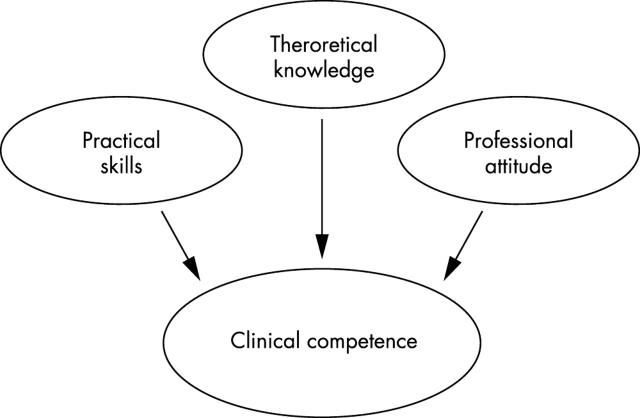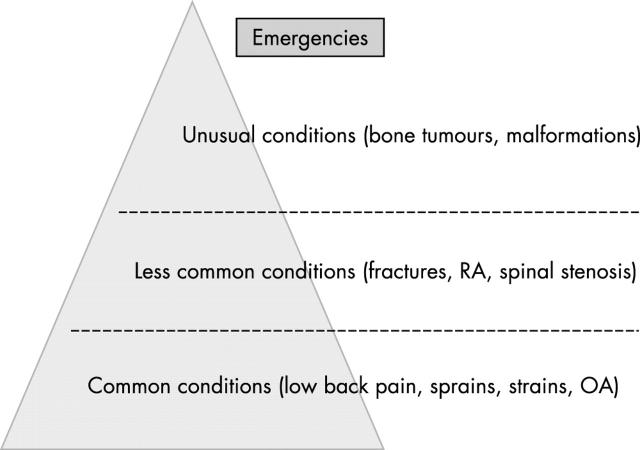Abstract
Objective: To develop core recommendations for the learning outcomes of an undergraduate curriculum in musculoskeletal conditions for any parts of the globe.
Methods: Recommendations were developed by wide consultation with experts in orthopaedics, rheumatology, osteoporosis, and rehabilitation from all parts of the world who had interest and experience in these specialties, with the support of international and national societies. All possible knowledge, skills, and attitudes that might be of relevance to musculoskeletal conditions were initially considered and then reduced to those considered essential for all doctors.
Results: The recommendations focus on (a) basic skills to assess and diagnose musculoskeletal problems; (b) the competency to assess specific common or urgent musculoskeletal problems; (c) the theoretical background of the conditions and their management; and (d) the core knowledge necessary to support diagnosis and management, including basic sciences. At the end of the course, all students should be able to differentiate normal from abnormal locomotor symptoms in a patient, determine the relevant investigations and interpret the results, formulate a limited differential diagnosis, recognise the impact of the problem on the individual patient, and make an appropriate management plan.
Conclusions: The recommendations set global standards for the minimum level of competence in managing patients with musculoskeletal problems. They define what all doctors should know when graduating from medical school, regardless of further specialisation. They are intended to form the basis of a curriculum for a musculoskeletal course and can be adapted for any medical school in any country throughout the world.
Full Text
The Full Text of this article is available as a PDF (215.7 KB).
Figure 1 .
The underlying principle for developing competency in the musculoskeletal conditions.
Figure 2 .
The structural levels related to prevalence and urgency used when developing the recommendations.
Selected References
These references are in PubMed. This may not be the complete list of references from this article.
- Ahern M. J., Soden M., Schultz D., Clark M. The musculo-skeletal examination: a neglected clinical skill. Aust N Z J Med. 1991 Jun;21(3):303–306. doi: 10.1111/j.1445-5994.1991.tb04694.x. [DOI] [PubMed] [Google Scholar]
- Akesson Kristina, Dreinhöfer Karsten E., Woolf A. D. Improved education in musculoskeletal conditions is necessary for all doctors. Bull World Health Organ. 2003;81(9):677–683. [PMC free article] [PubMed] [Google Scholar]
- Clawson D. K., Jackson D. W., Ostergaard D. J. It's past time to reform the musculoskeletal curriculum. Acad Med. 2001 Jul;76(7):709–710. doi: 10.1097/00001888-200107000-00012. [DOI] [PubMed] [Google Scholar]
- Crotty M., Ahern M. J., McFarlane A. C., Brooks P. M. Clinical rheumatology training of Australian medical students. A national survey of 1991 graduates. Med J Aust. 1993 Jan 18;158(2):119–120. [PubMed] [Google Scholar]
- Doherty M., Abawi J., Pattrick M. Audit of medical inpatient examination: a cry from the joint. J R Coll Physicians Lond. 1990 Apr;24(2):115–118. [PMC free article] [PubMed] [Google Scholar]
- Doherty M., Dacre J., Dieppe P., Snaith M. The 'GALS' locomotor screen. Ann Rheum Dis. 1992 Oct;51(10):1165–1169. doi: 10.1136/ard.51.10.1165. [DOI] [PMC free article] [PubMed] [Google Scholar]
- Freedman K. B., Bernstein J. The adequacy of medical school education in musculoskeletal medicine. J Bone Joint Surg Am. 1998 Oct;80(10):1421–1427. doi: 10.2106/00004623-199810000-00003. [DOI] [PubMed] [Google Scholar]
- Heinegård D., Johnell O., Lidgren L., Nilsson O., Rydevik B., Wollheim F., Akesson K. The Bone and Joint Decade 2000-2010. Acta Orthop Scand. 1998 Jun;69(3):219–220. [PubMed] [Google Scholar]
- Kay L. J., Deighton C. M., Walker D. J., Hay E. M. Undergraduate rheumatology teaching in the UK: a survey of current practice and changes since 1990. Arthritis Research Campaign Undergraduate Working Party of the ARC Education Sub-committee. Rheumatology (Oxford) 2000 Jul;39(7):800–803. doi: 10.1093/rheumatology/39.7.800. [DOI] [PubMed] [Google Scholar]
- Pinney S. J., Regan W. D. Educating medical students about musculoskeletal problems. Are community needs reflected in the curricula of Canadian medical schools? J Bone Joint Surg Am. 2001 Sep;83-A(9):1317–1320. [PubMed] [Google Scholar]
- Prideaux David. ABC of learning and teaching in medicine. Curriculum design. BMJ. 2003 Feb 1;326(7383):268–270. doi: 10.1136/bmj.326.7383.268. [DOI] [PMC free article] [PubMed] [Google Scholar]
- Rasker J. J. Rheumatology in general practice. Br J Rheumatol. 1995 Jun;34(6):494–497. doi: 10.1093/rheumatology/34.6.494. [DOI] [PubMed] [Google Scholar]
- Williams J. R. The teaching of trauma and orthopaedic surgery to the undergraduate in the United Kingdom. J Bone Joint Surg Br. 2000 Jul;82(5):627–628. doi: 10.1302/0301-620x.82b5.11332. [DOI] [PubMed] [Google Scholar]
- Woolf A. D., Akesson K. Understanding the burden of musculoskeletal conditions. The burden is huge and not reflected in national health priorities. BMJ. 2001 May 5;322(7294):1079–1080. doi: 10.1136/bmj.322.7294.1079. [DOI] [PMC free article] [PubMed] [Google Scholar]
- Woolf A. D. The bone and joint decade 2000-2010. Ann Rheum Dis. 2000 Feb;59(2):81–82. doi: 10.1136/ard.59.2.81. [DOI] [PMC free article] [PubMed] [Google Scholar]
- Woolf A. D., Zeidler H., Haglund U., Carr A. J., Chaussade S., Cucinotta D., Veale D. J., Martin-Mola E. Musculoskeletal pain in Europe: its impact and a comparison of population and medical perceptions of treatment in eight European countries. Ann Rheum Dis. 2004 Apr;63(4):342–347. doi: 10.1136/ard.2003.010223. [DOI] [PMC free article] [PubMed] [Google Scholar]




